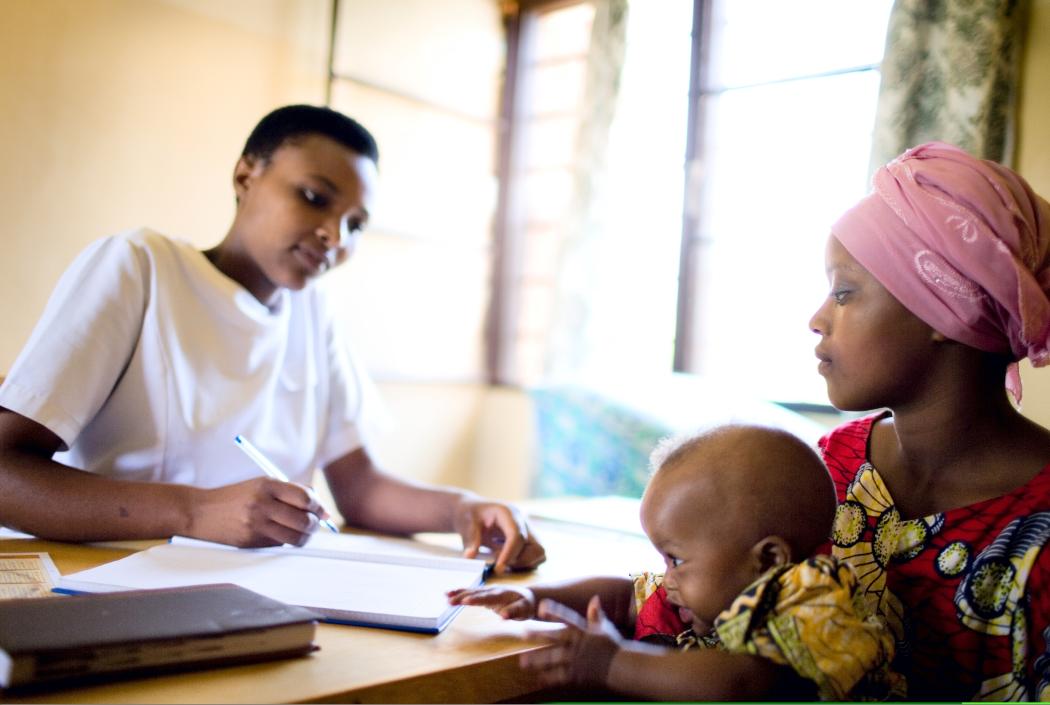The Future of Health Care in Rwanda Starts with a Strong Government Partnership

Just a decade ago, Rwanda struggled to provide high-quality health services. But when the Millennium and Sustainable Development Goals pushed for change, Rwanda was focused, proactive, and determined to provide better for its 12 million people. Now, the country is an example of how hopes for better health care can become a reality.
In the past two decades, the maternal mortality rate in Rwanda has dropped from 1,071 to 210 deaths per 100,000 live births and the under-five mortality rate has dropped from 196 to 50 deaths per 1,000 live births. Now, 90% of women have skilled assistance during delivery, child immunizations have steadily improved and 93% of children aged 12 to 23 months have received all basic vaccines.
And that’s just the beginning. Rwanda is making changes in its maternal and child health care, health workforce, infrastructure, and service delivery to achieve universal access to equal and affordable quality health services. It’s also turning its focus to global health security—the country shares a border with the Democratic Republic of Congo, which is currently experiencing the world’s second-largest Ebola epidemic.
We sat down with Samson Radeny, the leader of IntraHealth’s Rwanda programs, to discuss what the future of health care looks like in the country and how his team is helping to achieve the country’s maternal, newborn and child health goals.
Your team has been instrumental in reducing maternal, neonatal, and child mortality in Rwanda. What has contributed to this success?
Rwanda is one of the few countries in the world that is recognized for its outstanding progress promoting the fifth Sustainable Development Goal (Gender Equality and Women Empowerment). And the government is very focused on achieving the third Sustainable Development Goal (Good Health and Wellbeing). We’ve seen the government of Rwanda make tremendous strides in the last decade and we are a key partner with the Ministry of Health to reach very ambitious but achievable targets.
We’ve been helping reduce maternal, neonatal, and child mortality through our USAID-funded Ingobyi project by strengthening capacity of health care providers through training and mentorship and strengthening systems to improve access to high-quality maternal, newborn and child health care services. The government’s commitment is helping us succeed because we are all part of a movement that seeks to prevent deaths and save lives, especially lives of babies and children. I have no doubt IntraHealth will continue to achieve great things because of our strong partnership with the government.
Are there other achievements you are particularly proud of?
We’ve been developing eLearning platforms for community health workers. The government has 60,000 community health workers who provide important services in their communities but there is need for ongoing and proper training. So we are developing an eLearning training program that will launch in March 2020 and will allow community health workers to access trainings in health facilities.
We are working with the Ministry of Health and other partners to prevent potential spread of Ebola Virus Disease into the country. Fortunately, we haven’t had any cases of Ebola in Rwanda but we are still on high alert and are making sure the infection doesn’t enter the country. A couple of months ago the government reached out to us and asked us to support the Ebola preparedness effort. We began by upgrading the Ebola call center that offers a hotline facility where people can send messages, ask questions, or report any suspected cases. We seconded three staff to receive calls and respond to questions from callers. We also train and mentor health workers to effectively respond in case they encounter an Ebola suspect case in any of the 375 health facilities we support through our Ingobyi project. Lastly, we are establishing Ebola isolation units. We are working with the Ministry of Health to renovate six existing facilities into isolation units where suspected cases would be contained and investigated. Through these steps, we are working with the government to make sure the country can immediately respond and prevent any loss of life if an Ebola case occurs.
What do you think will be most important to universal health coverage over the next decade?
The most important place to start is with government leadership. We are very lucky that the government of Rwanda has shown leadership in ensuring universal health coverage is not just a slogan, it’s something to work toward. The government of Rwanda is showing the country and the rest of the world that this is something we can achieve. That kind of leadership is a really important building block in achieving universal health coverage.
We need to continue to focus on the quality of care in the new decade because it’s one thing to talk about coverage and another to talk about care. We need to focus on quality of care across the board – for mothers, newborns and children. We need to make maternal, newborn and child health affordable by ensuring universal health insurance coverage for all Rwandans.
Dr. Radeny leads IntraHealth’s work in Rwanda, which is funded by the US Agency for International Development.
This piece is part of IntraHealth's celebration of 40 years of commitment to health workers. Follow along: #TheFutureOf #IntraHealth40 #HealthWorkersCount
